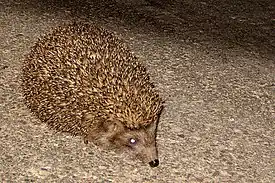< Reconstruction:Proto-Slavic

Reconstruction:Proto-Slavic/ežь
Proto-Slavic

*ežь (Erinaceus concolor)
Etymology
Inherited from Proto-Balto-Slavic *eźis, from Proto-Indo-European *h₁eǵʰis (“hedgehog”). Compare with *ǵʰḗr.
Baltic cognates include Lithuanian ežys, regional ẽżis and Latvian ezis. Other Indo-European cognates include Phrygian ἔξις (éxis) (read ἔζις (ézis)), Ancient Greek ἐχῖνος (ekhînos), Old English igil (English ile), Old High German igil (German Igel), Old Armenian ոզնի (ozni), Old Norse ígull, Ossetian уызын (wyzyn), Albanian eshk.
Declension
Derived terms
- *ežakъ, *ežikъ (diminutive)
- *eževъ(jь)
- *ežica, *ežika
- *ežina
- *ežiti (sę)
Descendants
- East Slavic:
- Old East Slavic: ежь (ežĭ), ожь (ožĭ)
- South Slavic:
- West Slavic:
Further reading
- Trubachyov, Oleg, editor (1979), “*ežь”, in Этимологический словарь славянских языков [Etymological dictionary of Slavic languages] (in Russian), numbers 6 (*e – *golva), Moscow: Nauka, page 37
- Vasmer, Max (1964–1973) “ёж”, in Oleg Trubachyov, transl., Этимологический словарь русского языка [Etymological Dictionary of the Russian Language] (in Russian), Moscow: Progress
- Melnychuk, O. S., editor (1985), “їж”, in Етимологічний словник української мови [Etymological Dictionary of the Ukrainian Language] (in Ukrainian), volumes 2 (Д – Копці), Kyiv: Naukova Dumka, page 323
References
- Derksen, Rick (2008) “*ežь”, in Etymological Dictionary of the Slavic Inherited Lexicon (Leiden Indo-European Etymological Dictionary Series; 4), Leiden, Boston: Brill, →ISBN, →ISSN, page 149: “m. jo ‘hedgehog’”
This article is issued from Wiktionary. The text is licensed under Creative Commons - Attribution - Sharealike. Additional terms may apply for the media files.